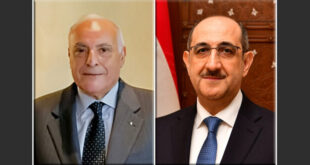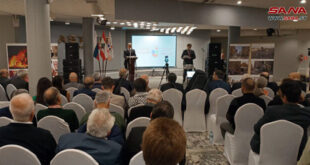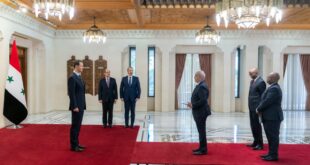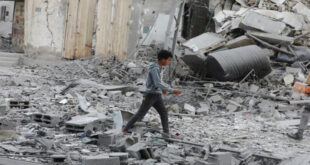Damascus, SANA- In coincidence with declaring it free from terrorism in April last year, the health sector’s cadres were the first to arrive in the towns of the Eastern Ghouta in Damascus Countryside to deal with the emergency cases and to meet the needs of the patients.
Today, a year after crushing terrorism, Damascus Countryside Directorate continues to exert tireless efforts to achieve the recovery of its institutions in the towns of the Eastern Ghouta as 14 health centers have been rehabilitated so far.
Immediately after liberating the Ghouta, Damascus Countryside Heath Directorate has worked on taking all the required measures to provide the requirements of the healthcare for the locals through reactivating the affected health centers and supplying them with the required medical equipment and cadres and through sending mobile clinics.
Head of the Directorate Dr. Yaseen Naaous told SANA that 14 health centers were opened in most areas of the Eastern Ghouta over the past year, adding that there are 14 health centers and three hospitals in al-Mlaiha, Kafr Batna and Harasta which are under construction.
He indicated that the cost of rehabilitating Harasta Hospital was estimated at SYP 552 million without the equipment, adding that it will be rehabilitated in cooperation with the UN Development Program (UNDP), while al-Mlaiha Hospital is under construction and it will be put into service by the end of the current year.
Work is still underway at Kafr Batna Hospital to be put into service next September, according to Naaous.
Naaous said that the medical services provided over the past year included more than 85 thousand services of routine vaccinations for children and 97 thousand nutrition monitoring cases, in addition to providing reproductive health services for women and the psychological and social support for more than 83 thousand persons.
He added that since the first moments of the exit of Eastern Ghouta locals through Hammouryia corridor in mid-March last year, Damascus Countryside Health Directorate has exerted tireless efforts to transport the emergency critical cases to the hospitals of Damascus and its countryside and to implement an emergency response to provide the necessary healthcare requirements within the temporary housing centers as at that time it provided 13 ambulances, 5 mobile clinics and 16 round-the-clock medical teams embracing 250 health workers.
Ruaa al-Jazaeri
 Syrian Arab News Agency S A N A
Syrian Arab News Agency S A N A




